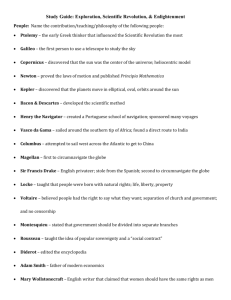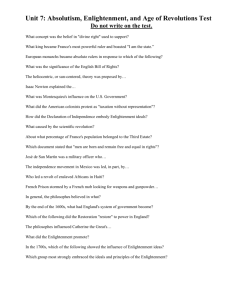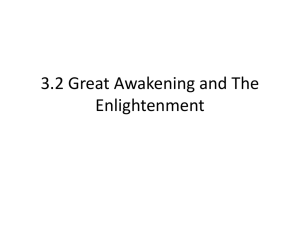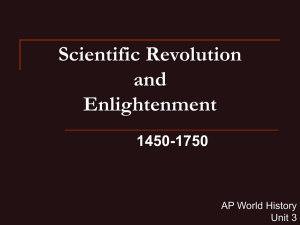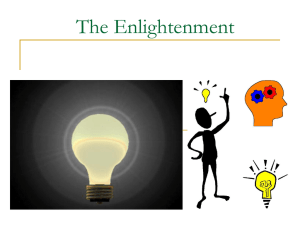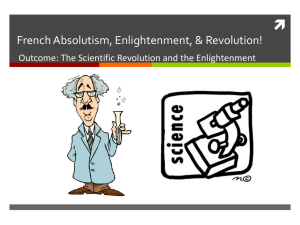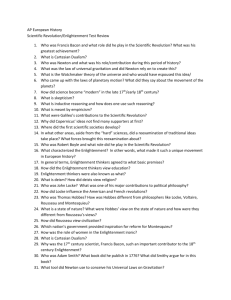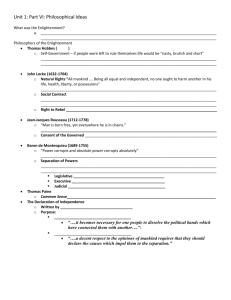Sample Unit Plan #2-Revolution in Thought
advertisement
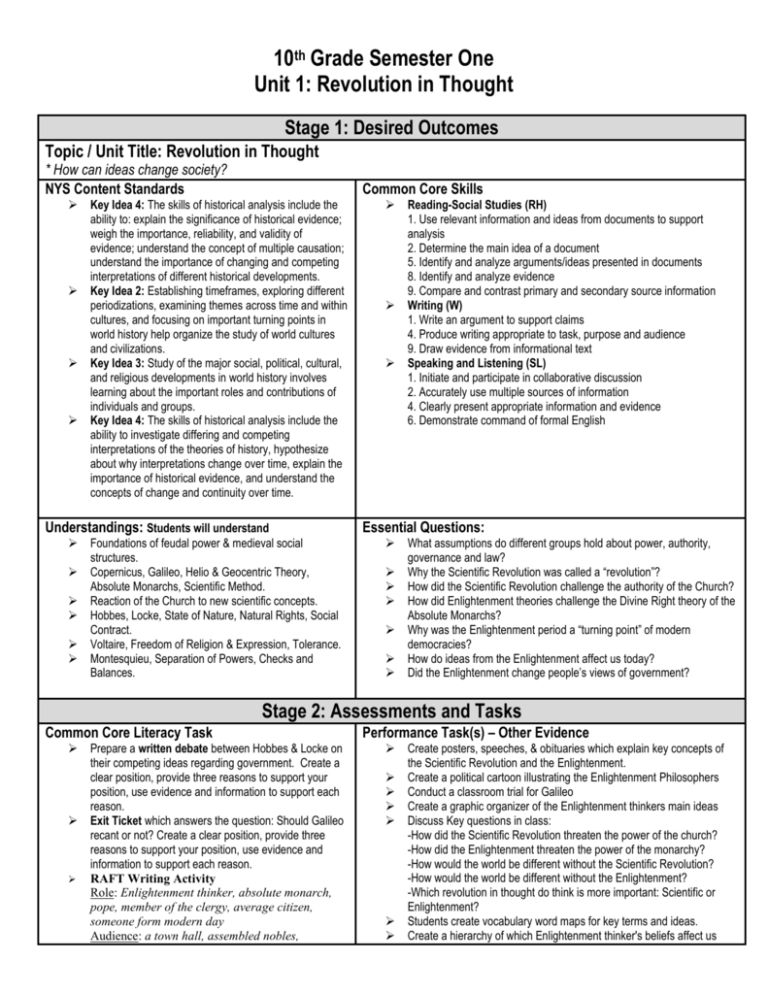
10th Grade Semester One Unit 1: Revolution in Thought Stage 1: Desired Outcomes Topic / Unit Title: Revolution in Thought * How can ideas change society? NYS Content Standards Common Core Skills Key Idea 4: The skills of historical analysis include the ability to: explain the significance of historical evidence; weigh the importance, reliability, and validity of evidence; understand the concept of multiple causation; understand the importance of changing and competing interpretations of different historical developments. Key Idea 2: Establishing timeframes, exploring different periodizations, examining themes across time and within cultures, and focusing on important turning points in world history help organize the study of world cultures and civilizations. Key Idea 3: Study of the major social, political, cultural, and religious developments in world history involves learning about the important roles and contributions of individuals and groups. Key Idea 4: The skills of historical analysis include the ability to investigate differing and competing interpretations of the theories of history, hypothesize about why interpretations change over time, explain the importance of historical evidence, and understand the concepts of change and continuity over time. Understandings: Students will understand Foundations of feudal power & medieval social structures. Copernicus, Galileo, Helio & Geocentric Theory, Absolute Monarchs, Scientific Method. Reaction of the Church to new scientific concepts. Hobbes, Locke, State of Nature, Natural Rights, Social Contract. Voltaire, Freedom of Religion & Expression, Tolerance. Montesquieu, Separation of Powers, Checks and Balances. Reading-Social Studies (RH) 1. Use relevant information and ideas from documents to support analysis 2. Determine the main idea of a document 5. Identify and analyze arguments/ideas presented in documents 8. Identify and analyze evidence 9. Compare and contrast primary and secondary source information Writing (W) 1. Write an argument to support claims 4. Produce writing appropriate to task, purpose and audience 9. Draw evidence from informational text Speaking and Listening (SL) 1. Initiate and participate in collaborative discussion 2. Accurately use multiple sources of information 4. Clearly present appropriate information and evidence 6. Demonstrate command of formal English Essential Questions: What assumptions do different groups hold about power, authority, governance and law? Why the Scientific Revolution was called a “revolution”? How did the Scientific Revolution challenge the authority of the Church? How did Enlightenment theories challenge the Divine Right theory of the Absolute Monarchs? Why was the Enlightenment period a “turning point” of modern democracies? How do ideas from the Enlightenment affect us today? Did the Enlightenment change people’s views of government? Stage 2: Assessments and Tasks Common Core Literacy Task Prepare a written debate between Hobbes & Locke on their competing ideas regarding government. Create a clear position, provide three reasons to support your position, use evidence and information to support each reason. Exit Ticket which answers the question: Should Galileo recant or not? Create a clear position, provide three reasons to support your position, use evidence and information to support each reason. RAFT Writing Activity Role: Enlightenment thinker, absolute monarch, pope, member of the clergy, average citizen, someone form modern day Audience: a town hall, assembled nobles, Performance Task(s) – Other Evidence Create posters, speeches, & obituaries which explain key concepts of the Scientific Revolution and the Enlightenment. Create a political cartoon illustrating the Enlightenment Philosophers Conduct a classroom trial for Galileo Create a graphic organizer of the Enlightenment thinkers main ideas Discuss Key questions in class: -How did the Scientific Revolution threaten the power of the church? -How did the Enlightenment threaten the power of the monarchy? -How would the world be different without the Scientific Revolution? -How would the world be different without the Enlightenment? -Which revolution in thought do think is more important: Scientific or Enlightenment? Students create vocabulary word maps for key terms and ideas. Create a hierarchy of which Enlightenment thinker's beliefs affect us gathering of church cardinals, students from modern day Format: Letter, journal, dialogue, speech, poem/song lyrics Topic: science, treatment of criminals, who should make rules in society, separation of powers, role of women in society Write a 4 paragraph essay: Answers the unit question: How can ideas change society? Write an introduction with a position (thesis) and 2 supporting paragraphs using evidence from the Scientific Revolution & the Enlightenment. most today How will students reflect upon and self-assess their learning? Students will be asked to write a reflection based on what they learned and how effectively they worked. Reading feedback on essays and other written work. Stage 3: Learning Plan Instructional Activities and Materials (W.H.E.R.E.T.O.) Aim: Was the Scientific Revolution a rejection of traditional authority? Identify/define: Scientific Method. Copernicus. Galileo, Newton, Descartes. Explain how the Scientific Revolution’s emphasis on observation, experimentation, investigation, and speculation represented a new approach to problem solving. Discuss the contributions and works of Copernicus, Galileo, Newton, and Descartes. Assess the role of science and technology in the changes that took place in Europe from 1450-1770. Evaluate the extent to which the Scientific Revolution was a rejection of traditional authority. Evaluate the extent to which the tensions between traditional authority and science and technology still exist. Suggested Documents: Nicolaus Copernicus, On the Revolutions of the Heavenly Spheres: Galileo Galilei, Letter to the Grand Duchess Christina and Dialogue Concerning the Two Chief World Systems: Rene Descartes, Discourse on Method. Exit Activity – Exit Ticket which answers the question (including supporting evidence and examples): Should Galileo recant or not? Why? Aim: Was the Enlightenment a result of the Scientific Revolution? Identify/Define: philosophies, Age of Enlightenment, natural law, natural rights, separation of powers, checks and balances, tyranny, Age of Reasons, physiocrats, civil liberties, laissez-faire. Discuss the main ideas of the writings of the Enlightenment: Voltaire, Rousseau, Montesquieu. Explain the main ideas of the Enlightenment. Evaluate whether the ideas of the Enlightenment apply in today’s society. Evaluate whether the Enlightenment was a belief or an idea. Exit Activity – Illustrate an Enlightenment concept (cartoon) – Visual representation of the core beliefs of an Enlightenment philosopher. Aim: Did the Enlightenment change people’s views of government? Identify/define: Rousseau’s Social Contract, Diderot’s Encyclopedia, Montesquieu’s The Spirit of Laws, John Locke’s Two Treatises of Government, Thomas Hobbes’ The Leviathan, Adam Smith’s The Wealth of Nations, democracy, nationalism. Discuss and analyze the impact of the Enlightenment on the development of democracy in Europe. Evaluate the effect of the Age of Enlightenment on ruling monarchs. Describe and analyze the effects of the Enlightenment on 18th century Europe. Evaluate the extent to which the Enlightenment changes people’s views of government. Exit Activity – Answer the following question in paragraph form: Whose ideas about government were better, Hobbes’ or Locke’s? Teacher Reflection for Future Planning Evaluate exit tickets and response to questions during discussion. Explore test results and essay writing skills on class exam to shape future writing lessons/assignments.
